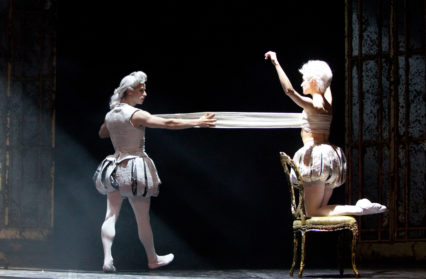As Northern Ballet’s production of Kenneth Tindall’s Casanova comes to Cardiff’s New Theatre, Wales Arts Review talks to three of the central figures of this stunning new show.
Giuliano Contadini, Leading Soloist
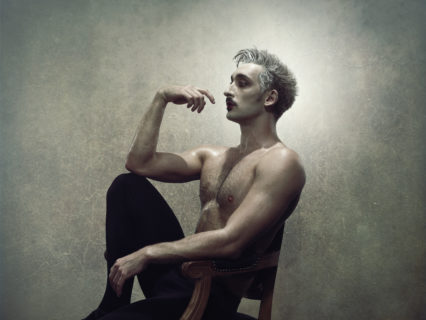
What is it like to play ‘the great seducer’?
To be able to play Casanova is hands down amazing and creating the role is an honour. There’s nothing like it in the ballet world and I can’t wait to perform it on stage!
When did you get cast in your role?
I remember it very well. It was a day like any other; we were rehearsing Beauty & the Beast and I went for lunch with Kenneth Tindall. We talked about the tour, rehearsals… everyday ballet stuff. As I began to make my way back to rehearsals he stopped me. He said that he wanted to be the one to tell me. “It’s going to be you; I’m creating Casanova on you.” I gave him a big hug and, after the initial shock, let’s just say it was hard to stop smiling!
Has your view of Casanova changed since you started working on the ballet?
Casanova was, for me, a symbol of seduction and lust. Working on this ballet, I have learnt that this was just one of the many faces of Casanova. He was a priest, soldier, violinist and spy to name just a few. He spoke many languages and travelled huge distances all over Europe, at a time when a journey that would take one hour today would’ve taken a whole day. There’s so much more to him than a serial seducer and this ballet will definitely bring that to light.
Have you learnt any interesting facts about Casanova?
I’ve definitely learnt a lot about Casanova. He was so intelligent – he could speak five or six languages. His Mother was absent for most of his life, so he taught himself a lot. He was a confident man but he was also troubled. He was very adaptable, charming, and would always make the best out of a situation. He did sleep with a lot of women – but not as many as you think. He always respected women and completely fell in love with them; he wasn’t just a sex pest! Casanova was a lot more rounded and interesting than people think.
How do you prepare for such a famous role like Casanova?
It’s actually quite good when you are creating a role that is well known, because there’s usually a lot of information out there that you can work with – online, in books, or in films. Casanova wrote a whole memoir about his life – what better resource is there than that! We have also been lucky to work with Ian Kelly, who is an expert on Casanova and the 18th century. During your research it is also important to keep in mind and understand the vision of the production itself.
What are the costumes like?
The costumes are just fantastic; Christopher Oram (Set & Costume Design) did such an incredible job. They bring the 18th century to life with a contemporary and up-to-date look. They’re so interesting; sensual and provocative but classy – they’re going to look fantastic on stage.
What can audiences expect from Casanova?
In some ways they are definitely going to get what they might expect – there’s lots of very sensual scenes. But I would say to keep an open mind because we do show a different side to Casanova. We portray some of his failures and tragedies as well as some of the great, interesting, sexual and exciting parts of his life. It’s a very big journey, and is fast paced because there’s so much to show. It will be spectacular – you won’t be disappointed.
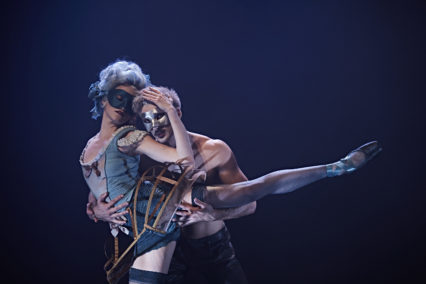
Kenneth Tindall, Choreographer and Scenario Writer
What inspired you to make a ballet about Casanova?
I think on the surface it’s immediately a title that lends itself well to ballet. Set against the backdrop of 18th century Venice and Europe, the visuals are alluring and fascinating. It has room for large corps numbers as well as lots of truly interesting characters – and of course plenty of room for intimacy. What is inspiring to me is that it is a real story of a real man, an original ballet based on fact. I also feel we can bring a new perspective to Casanova through our medium.
How much did you know about Casanova and his life before creating the ballet?
At the start like most, I just knew him as the serial womaniser: the Libertine. I had seen various films and thought I had an idea of what he was like. Pretty simple right – just a guy who had a lot of sex. So to answer your question, not much – as I would soon find out…
How does it feel to be choreographing a full length ballet for Northern?
I am truly delighted to be doing my first full-length with Northern Ballet – it feels full circle. David Nixon (OBE, Artistic Director at Northern Ballet) was the one who guided me into choreographing and has been very supportive of my career.
What has it been like working with the collaborators for Casanova?
It’s been an absolute dream; they are all so incredibly talented and open. It has been a huge privilege to share their creative processes and I’ve learnt a great deal from each one. Good honest collaboration is at the heart of this work.
Can you tell us about the look of the ballet – the sets and costumes?
I’m really excited about the world and the vision we are bringing to the stage. I believe it offers a fresh perspective, honouring the 18th century whilst managing to give it a modern edge. The set is very imposing, grand and versatile. The costumes are beautifully designed and very cleverly deconstruct the period to allow the bodies and the classical lines to be seen.
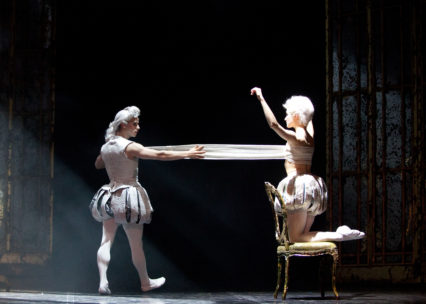
How about the music?
For the music, I was very keen to do something not typically 18th century or necessarily strictly classical, but to marry the worlds in a different way. I commissioned film and TV composer Kerry Muzzey and the resulting sound is a gorgeous mix of melodies, clear narrative themes and cinematic atmosphere – it’s an absolute pleasure to create to.
You retired from dancing in 2015. What has the transition been like from dancer to choreographer?
It seems to have flown quite naturally; they are in a lot of ways the same world, so you know the language. The hard thing for me was solitude and finding myself spending the majority of my day working alone – quite a change from being surrounded by 40 odd colourful characters. Also when something that has been your identity and your life for so long changes and your daily routine is no longer the one you have practiced for most of your life, you question who you are now. It’s been a big learning curve.
Ian Kelly, Scenario Writer
How does it feel to be co-creating Casanova?
It’s so exciting I can’t tell you! It’s fabulous. To be on this particular journey, being a historical biographer but also an actor and playwright, is beyond fascinating and exciting. I am agog at the beauty that’s being created around me. There is the most astonishingly gorgeous score, the most beautiful designs I’ve ever seen for the stage, so I’m immensely honoured that this should come out of my book – out of Casanova’s story.
One of the other incredibly exciting things about it all is that all of us in the team apart from Kenny are new to ballet, but we all serve the same agenda of paying attention to this fascinating period and to this complicated, vibrant, vital man. We’re all on this amazingly exciting journey because of the imaginative fire lit by Giacomo Casanova 200 years ago.
What was the process of creating the scenario with Kenneth Tindall like?
It was brilliant, we had such fun. Kenny came to live with me for a couple of weeks at my place in Suffolk. It’s 18th century, and also around the corner from where Frederick Ashton used to live, so it’s an area steeped in ballet tradition. We sat in this 18th century room to decide what the core of this story was, because the Casanova story is monumental, until we had a draft we could work with.
The ballet isn’t what you think you know about Casanova. It is to an extent about sex and sexuality, but Casanova was so much more than that. We wanted to explore him as an important cultural figure with an amazingly dramatic, and ultimately rather sad, life.
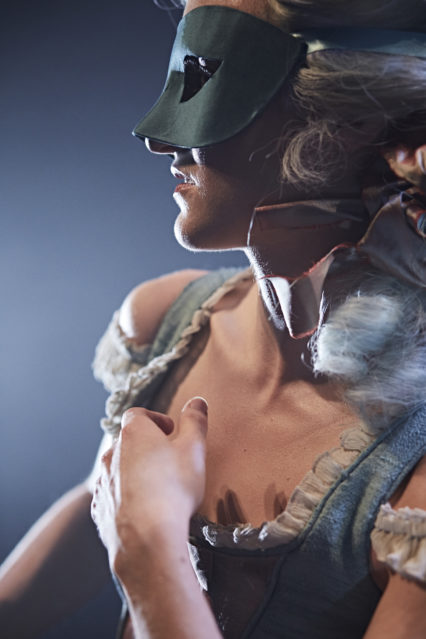
How different is the world of dance to the world of acting/the theatre?
Dance is so impressively disciplined. We’re kind of lazy in the theatre; there are an awful lot of coffee breaks and chats. But gosh, the dancers are phenomenal. It’s been fascinating to see the logistics and the military planning involved in a classical company of this standard; theatre and film seem so simple in comparison. I am also very aware that although the dancers are athletes and disciplined beings, they also want to tell a story and inhabit a character. To be around that desire feels very familiar as an actor, because to go on those imaginative journeys is why any of us are performers.
What led to your interest in the 18th Century and the world of Casanova?
I have a fascination with the art, music, theatre and everything of that period, but I’m also interested in that period being very resonant with now: that modernity was born of the 18th century. Casanova is right at the centre of it all, and is one of the few people who wrote down everything he remembered about his life.
What is it about Casanova’s life that lends his story to ballet?
The core and significance of his memoirs are Casanova trying to nail the importance of living every moment to its fullest and paying attention to life as it passes. This is what dance does for us as well, because dance exists in a space for that moment, for that audience only, and for those dancers. Therefore his story, which comes right at the birth of classical ballet, is definitively a dance story.


